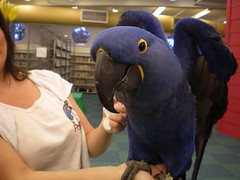One immediate, sometimes off-putting behavior of birds is biting. Many parrots can no doubt inflict a severe wound with their beaks, but not all "biting" is bad. A bird uses its beak not only to eat and defend itself, but to communicate affection to fellow birds. Despite it's appearance a bird's beak is very sensitive. The most useful sense to a bird next to it's eyesight is it's sense of touch. They will put their beak on everything. This is how they investigate and perceive their world. Their beak can give them massive amounts of information from edibility to temperature. As most bird owners know, a gentle mouthing by your bird is an everyday occurrence, and should be welcome. Most of the time when a bird "bites" it has nothing to do with aggression,they are merely curious, and if you can be patient and control your fear, you'll find they aren't biting hard at all.
Another affectionate yet misunderstood behavior of birds is vomiting. If your bird vomits on you, consider yourself lucky! Your bird loves you! Starting from the moment they are hatched, birds throw up on each other. We've all see a mother bird regurgitate her food for her babies, but most people don't know this behavior doesn't stop when the bird becomes grown. All birds have an organ called a "crop" in their digestive tract, just before their stomach. The purpose of this organ is to hold small amounts of food, to be regurgitated on a whim. In a flock, adult birds often share small amounts of this food with each other to strengthen their bond, and communicate what kinds of food individual birds are finding in the area.
Before you dismiss a large bird as aggressive, or even insulting. Look at the bigger picture of your bird's behaviors. You might just find you had a best friend that was just showing you love, the only way it knows how!


No comments:
Post a Comment